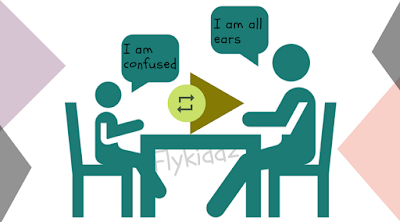In dictionary language "counselling" is advice by an expert about a particular problem. During some of the other phase of life, there is a time when kids need counselling and parents often consult specialists to handle the situation. The question arises Can parents counsel their child themselves?/"How can I counsel my child?" Are we competent enough to deal with the issues bothering our child? Though we may not be expert in each and every matter we are the first teachers of our child and who knows our child more than we do. We as parents can be the first counsellors. Nevertheless, counsellors are highly trained people and well equipped with updated techniques but as parents, we can give first try to counsel our child unless the situation is alarming.
Post your suggestions in the comment section which may help parents facing serious challenges with kids.
 |
How can I counsel my child? |
How can I counsel my child?
The phrase "my child" is significant because it is difficult to counsel our kids as they are familiar to us. They may be hesitant to open and pour out their heart to us. Moreover, we may be biased towards their story as we know our kids in and out (as most parents think) but if we understand them from third person angle we can be their best counsellors. For this, we have to put lots of efforts and make sure to be thoroughly committed to the goal before taking up the challenge. The common reasons for counselling are:- mental illness
- traumatic event
- difficult family situation
Homework for parents:
- The first and foremost step is to view the whole scenario as a third person.
- A single parent has no choice of who would be the counsellor. In cases where the choice is to be made between father or mother, one who is strong-headed should take the leap. The other partner must not interfere in the process and provide full support and have faith in the ways devised by the counselling parent. He/she can be consulted (if required) when the need arises.
How to proceed?
- Patience and oral communication are prerequisites.
- As a third person would do first be a good friend of your child. For this start spending time with the child. Create such an environment that child starts believing you which is the foundation for strong and healthy communication.
- Always initiate an open-ended conversation so that the child could carry on comfortably without hesitation. This might give a clue to parents how to unearth the story.
- Along with verbal communication engage the child in activity-based games and encourage him/her to participate with you. Divert his/her mind from emotional disturbances and negative feelings.
- Try to be available for the child when he/she wants to talk to you. Be an active listener and pay thorough attention to what child speaks uninterruptedly. His/her emotions will erupt in parts. Your body language must show that you are listening attentively. This makes the child feel that he is being heard and strengthens belief in the parent. During all this, it is important that parents must control their emotions and do not interrogate.
- Every time after conversation parents must be calm and cool in front of the child.
- Take interest in whatever the child does. Show your eagerness to know about his/her likings, favourite music, games, food etc. Watch carefully his/her drawings, activities, reactions to various objects or situations or people. This might give an insight into issues affecting the child.
- Be ready to listen to anything the child says because he/she might be trying to express feelings but never analyse.
- Hold on your reactions or anger if something is said against you because children might take things differently which we as elders do not expect.
- When the story is complete give your best shot and advise only when you are fully prepared. Never be in a hurry to vent out your thoughts. Also do not be surprised if the child disagrees. Instead, ask him/her what steps he/she would have taken. Being a third person we cannot force them to accept and do as we say. Our aim is to bring him/her back on track.
- We have to see the situation from their eyes and respect what they say.
Post your suggestions in the comment section which may help parents facing serious challenges with kids.
yes,children need to be addressed with great care
ReplyDeleteI completely agree with this thought of understanding between the child and parents.
ReplyDeleteTo know whats the root cause its important to gain the confidence of the person. We run so much after the norms and competition occurring everywhere that we forget the individuality of a human.
Yes, the first counselors and teachers are the parents themselves.
The child who gets this kind of understanding from their parent's end, can never feel stuck in any situation of life.
very well said !
Thank you so much
Delete